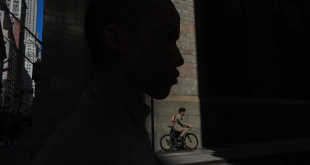It’s the age old question: nature or nurture? In the Netherlands, it’s clearly both. Cycling is catered for in the Netherlands, and so there are lots of cyclists. Because there are lots of cyclists, cycling is catered for. Shirley Agudo’s new book – ‘The Dutch & Their Bikes: Scenes from a Nation of Cyclists’ – has 352 pages of inspirational photographs of people riding bicycles in the Netherlands, a totally normal activity (so normal, in fact, that the Netherlands isn’t a nation of "cyclists" it’s a nation of "people who ride bikes"). Interspersed with the photos are quotes from thought-leaders, and background text from Agudo herself. She’s an American photographer and author and has been living in the Netherlands for more than 15 years. She says one of the aims of her new book is to “help other countries become more cycling-friendly.”
Her previous book – ‘Bicycle Mania Holland’ – also carried lots of photographs of the cycling culture in the Netherlands. Controversially, Agudo quotes Dutch natives who talk about cycling being handed down as some form of genetic inheritance (“to us Dutch people, riding our bicycle is a given – it is in our genes”), a claim that’s anathema to some cycle campaigners, who believe the strong culture of cycling in the Netherlands is due to infrastructure alone and that any country could “Go Dutch.”
Dutch cycle historian Kaspar Hanenbergh has an article in the book. He argues that the strong cycling culture in the Netherlands was already strong by 1911 and that, while motor cars were making more journeys in the Netherlands by 1960 and cycling risked being pushed aside, there was no falling off the cliff moment, as happened to cycling in the UK in the 1950s. “By 1960…the bicycle had sufficiently become part of the Dutch culture to withstand the age of the motor car and survive it.”
He also talks about the bicycle’s “strong comeback” in the 1980s and 1990s when the local and national governments in the Netherlands put more and more money into providing world-class infrastructure for people travelling on cycles.
Charles Rubenacker, of Bicycle-culture.com, said: “The Dutch have created the safest and most complete bicycling network in the world, but we need to look beyond infrastructure and into their collective souls to better understand why riding a bicycle is so normal in the Netherlands.”
Hans Voerknecht, senior adviser at Dutch Knowledge Platform on Mobility, said: “In some countries, cycling has a bad image, and represents low social status…This not the case in the Netherlands, where bicycle use is the same for almost every population group.”
Part of this cultural acceptance of the bicycle is due to the Dutch national character, believes Jacob Vossestein, a Dutch anthropologist. In the book he said: “As the Dutch are not ‘into’ status games, cycling becomes a very egalitarian means of transport…the bike satisfies the Dutch inclination to not waste any resources – an aspect of ingrained practicality.” He also said “You are not made of sugar; you won’t melt in the rain,” a reference to the all-weather hardiness of Dutch people, who likely own cars but eschew them for short journeys.
Agudo agreed: “The Dutch are very hardy people, and they cycle routinely through rain, sleet and snow, as well as gale-force winds.”
She adds: “Cycling has successfully become such a prominent part of everyday life in the Netherlands because the Dutch Government, both national and local, supports cycling in a major way.”
Agudo’s book is available for €29.90 and is published by Scriptum XPat.
 BikeBiz Bicycle and cycling retail news
BikeBiz Bicycle and cycling retail news



